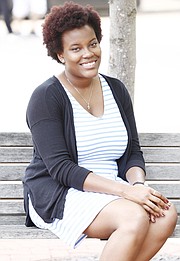Wednesday, December 30, 2015
When the news broke of no indictment against the officer in the Tamir Rice case on Dec. 28, I wasn't shocked or surprised. I was disappointed, I ached for Tamir's family, but mostly, I was afraid for my own. Too often, I've followed cases like these to find that in the end, the answer that seems most obvious isn't the one that juries reach. To hear that an officer killed a 12-year-old and then wasn't charged with anything rattles me in a way that I've never thought to worry about before I started paying attention to national news. I'm 22 years old, but I'm afraid to have children.
It's not the physical act of labor that's terrifying, nor the debt of raising a child—doctor's visits, sports, college tuition. It's the fact that once I give birth to my child, his or her black body isn't their own, yet he or she will bear the weight of every black soul in America. For my birthday, a friend of mine gave me a copy of "Between the World and Me" by Ta-Nehisi Coates. In it, the author writes to his son: "You are a black boy, and you must be responsible for your body in a way that other boys cannot know. Indeed, you must be responsible for the worst actions of other black bodies, which, somehow, will always be assigned to you."
I remember reading these sentences again and again, crying while swinging in a hammock at my grandmother's house. Those lines took me back to the grand-jury hearing in the case against Darren Wilson, the officer who shot down Mike Brown on Aug. 9, 2014, just four days before my 21st birthday. Then on Nov. 24, I sat in my too-small twin bed on the campus of my HBCU and watched a prosecutor hand down a no-indictment ruling, and for the first time, I knew that I was afraid. As a black female, I've been exposed to many aggressions and subtle assertions of power that felt like direct disrespect to who I am, such as crushes not accepting the shade of my skin or white male managers whose eyes always lingered and hands found their way to my hips repeatedly while trying to pass me during a busy lunch rush. These things, however minute, feel like assertions of power over my black body, and while I've encountered an angry police officer, I've never been pulled over and felt like that day was my last. Sandra Bland wasn't that lucky.
This commodification of black bodies is as old as America, and just about every day, I'm reminded of how much my black body is worth. It pained me to watch the video of an officer slinging a 15-year old-girl to the ground at a pool party in Texas because a white woman felt like the girl didn't belong in her space. I was in tears at the video of the South Carolina high school student thrown like a rag doll across the classroom. Schools are supposed to be safe spaces for children, and while that case ended up being more about the officer's anger issues than her race, it still hurts to think about it.
Nearly every problem in this country—racism, classism, sexism—is about power. How am I supposed to tell a child that my future husband and I will raise in love that he or she will be seen as less than in the eyes of non-black counterparts? I may be young, but the thought of my child being reduced to his or her physical appearance sends my heart racing. I've seen far too many cases with mountains of evidence against the abuser, attacker or murderer, and yet, in nearly all of them, the one oppressed, especially if black, is on trial. In three seconds, Tamir Rice was shot. Bettie Jones and Quintonio LeGrier were shot simply opening the door after the officers were called to their home for help. It's painful to think that it could be my mother receiving that phone call, planning a funeral, organizing rallies. It's frustrating to think that one day, that may be me.
As I've gotten older, I've noticed more injustices that my young eyes didn't think were important. I'm trying to learn to navigate through this world without being buried beneath fear, but the more I hear about police brutality, abuse of power and privilege going unchecked, it feels like the world is resistant to change. All I can do is pray for my generation and generations after me and hope that, one day, black bodies won't bear the brunt of this unrelenting hatred.
So far, I'm not convinced.
